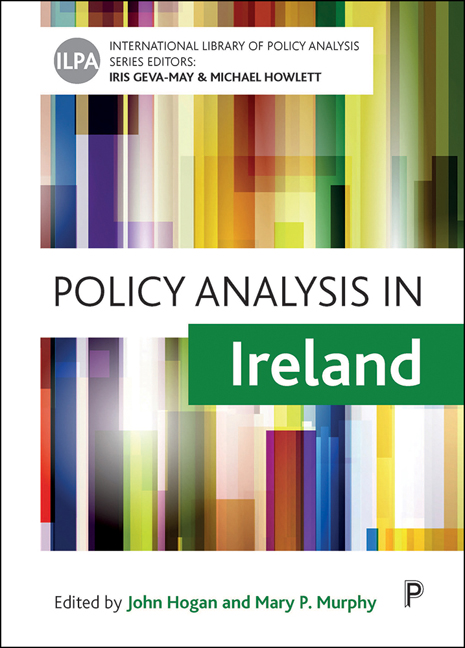Book contents
- Frontmatter
- Contents
- List of figures, tables and boxes
- List of abbreviations
- Notes on contributors
- Editors’ introduction to the series
- Acknowledgements
- Foreword
- Preface
- one Contextualising policy analysis in Ireland
- Part One: History, styles and methods of policy analysis in Ireland
- Part Two: Policy analysis at various levels of government: from local to the EU
- Part Three: Think tanks, interest groups, political parties and gender-based policy analysis
- Part Four: The public, science and the media: the wider policy analysis environment in Ireland
- Index
fifteen - Democratic innovations and policy analysis: climate policy and Ireland’s Citizens’ Assembly (2016–18)
Published online by Cambridge University Press: 18 December 2021
- Frontmatter
- Contents
- List of figures, tables and boxes
- List of abbreviations
- Notes on contributors
- Editors’ introduction to the series
- Acknowledgements
- Foreword
- Preface
- one Contextualising policy analysis in Ireland
- Part One: History, styles and methods of policy analysis in Ireland
- Part Two: Policy analysis at various levels of government: from local to the EU
- Part Three: Think tanks, interest groups, political parties and gender-based policy analysis
- Part Four: The public, science and the media: the wider policy analysis environment in Ireland
- Index
Summary
Introduction
In the past decade, Ireland has emerged as a world leader in deliberative democracy as evidenced by its Constitutional Convention (CC) (2012–14) and Citizens’ Assembly (CA) (2016–18).
Complementing existing representative institutions and processes, these deliberative democratic innovations have placed citizens at the heart of constitutional change and political reform. Providing opportunities for wider and deeper citizen engagement in the democratic process, they offer citizens the chance to have a role in policy making and policy analysis beyond the ‘ballot box’. Arguably, this is all the more important at a time of rising democratic malaise, in Ireland and elsewhere, characterised by declining levels of trust in politicians and in traditional forms of political engagement (Elstub and Escobar, 2019; Farrell and Suiter, 2019). The emergence of these initiatives in the 2010s was part of a wider governmental response to the profound crises both in global capitalism and in Ireland's national economic and social situation that strained the relationship between government and the people. These crises acted as a catalyst for Ireland's new approach to constitutional and political reform, and latterly policy reform (Harris et al, 2013; Farrell and Suiter, 2019). More recently, these government-led initiatives have also started to address policy areas, for example how to respond to climate change and to the challenges and opportunities of an ageing population.
This chapter critically evaluates the potential of these deliberative forums (also known as mini-publics) as an innovative method of policy analysis. It focuses on a particular case – the contribution Ireland's first CA has made to climate policy. The chapter starts with a brief conceptual description of democratic innovations and policy analysis. It then offers an overview of Ireland's CA (practice and processes) and its link to the wider democratic system. Particular attention is paid to its contribution to climate policy. Finally, the chapter critically assesses the use of Citizens’ Assemblies as a method of policy analysis.
Democratic innovations and policy analysis
We have witnessed a proliferation of global innovations to reimagine democracy by re-engaging citizens in decisions on matters that affect their daily lives. These innovations can be found at various levels of government across a range of issues and with varying degrees of success. They are drawn from representative, direct, participatory and deliberative understandings of democratic theory. Electoral system reform and the extension of the franchise are but two examples of representative innovations.
- Type
- Chapter
- Information
- Policy Analysis in Ireland , pp. 219 - 234Publisher: Bristol University PressPrint publication year: 2021



